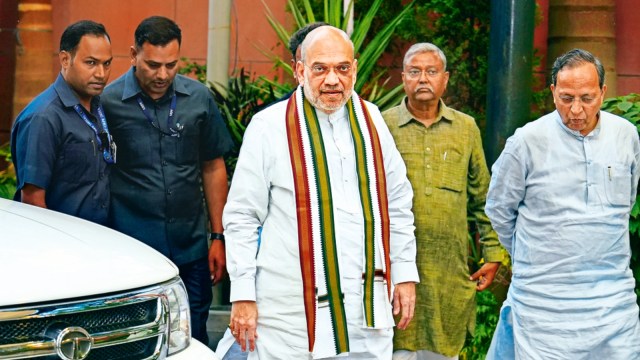

Feb 9, 2025 07:25 IST First published on: Feb 9, 2025 at 07:25 IST
The BJP appeared handicapped by a lethargic and late start in the Delhi Assembly election, besides poor selections. But in the last lap of the campaign, Amit Shah decided to take charge of the party’s leaderless flock. Shah has previously distanced himself from Delhi politics and openly expressed his contempt for the state leadership for its lack of grassroots engagement. He addressed two to three rallies daily and both PM Modi and Yogi Adityanath pitched in with rallies. Shah even requisitioned NDA allies to campaign in pockets where people from their respective states resided. Delhi MP and MoS Harsh Malhotra was the points person for information on facts and figures of various constituencies. The mood in the BJP camp turned upbeat as the party hammered home its point that without the Central Government’s support, the city would be rudderless. If this time the pollsters got it right, many seasoned Delhi reporters predicted wrongly. Historically, Delhi has always been a political minefieldwhere heavy weight politicians have been dislodged by rank outsiders. Arvind Kejriwal came from nowhere to unseat three-time chief minister Sheila Dixit in her New Delhi bastion. Now Parvesh Verma, considered a misfit in Lutyens Delhi, has similarly turned the tables on Kejriwal. Half a century earlier, Delhi’s Congress strongman Meher Chand Khanna was defeated by the Jana Sangh’s fledgling politician, Manohar Lal Sondhi, in the New Delhi Lok Sabha seat.
Makan’s Manoeuvre
Rahul Gandhi insistence on the Congress fighting the Delhi election independently, even when it was on a losing wicket and could only undercut AAP’s votes and help the BJP, upset not just INDIA allies, but also Congress president Mallikarjun Kharge. Congress treasurer and old Delhi hand, Ajay Maken, influenced Gandhi to let the state unit go it alone. The argument was that a successful AAP would extinguish Congress’s prospects in Delhi for a long time to come and also hamper the national party’s hopes for revival in Punjab.
Story continues below this ad
Gandhi feigned “illness” at the start of his campaign and avoided attending the rally in Sadar, because his aides had alerted him of thin attendance at the venue. Gandhi lost his cool and declared that he would address no rallies unless the state unit mounted a more aggressive campaign. He warned against the lazy route of relying on high-density Muslim pockets for mustering crowds as this would send the wrong signal and play into the BJP’s hands. Gandhi’s strategy proved correct, the Congress vote share increased by over two per cent and proved detrimental for AAP in many seats. Gandhi also demonstrated to regional parties that they would have to pay a price if they undermined the national party.
Sonia slips up
Apart from her claim of being able to muster 272 MPs and more while pulling down Vajpayee’s government in 1999, a very discreet Sonia Gandhi has seldom made a blooper in her long successful stint in politics. In Mani Shankar Aiyar’s just released book, A Maverick in Politics, Part 3 of his engaging memoirs, he testifies to this. He recalls how discreet Sonia was in revealing her hand — rather than speak out openly, she expressed her feelings by the warmth or coolness of her greetings. He himself was caught on the back foot, quitting the Congress and joining Mamata Banerjee’s TMC because of Sonia’s refusal to reveal her cards. Although he had ranted against the Kesri Congress, Sonia had not given him even a slight hint, despite his closeness to her late husband, that she was soon to join the Congress and send Sitaram Kesri packing. Sonia’s remark on President Droupadi Murmu after the latter’s Budget speech, when she called her “the poor thing” and “tired”, was uncharacteristic. Some suspect she spoke hastily, fearing that Rahul might impetuously make too strong and politically incorrect a remark.
Bugging Suspicions
Another nugget from Aiyar’s book is that some Congresspersons, including then PM P V Narasimha Rao’s right hand man, Bhuvnesh Chaturvedi, were keen to make Manmohan Singh, Rao’s finance minister, as the fall guy in the Harshad Mehta scandal so that the blame would not be directed at the PM. The author writes that when he visited Singh at his bungalow to alert him of his suspicion, Singh hinted to Aiyar that his house was bugged and insisted they should speak only on the lawns. Ironically, years later, when Aiyar was abruptly replaced as Petroleum Minister by the late Murli Deora, a close friend of oil tycoon Mukesh Ambani, Sonia Gandhi accused Aiyar of declaring in private conversations that he was removed as minister because he refused to collect money for the party. The author claims that he had expressed such sentiments only to his family and wondered whether his house was bugged!


